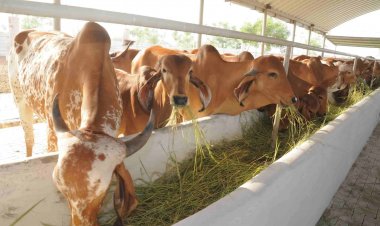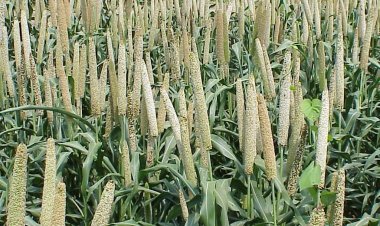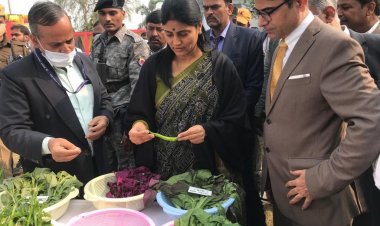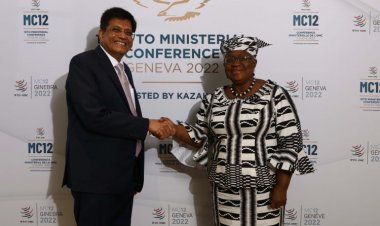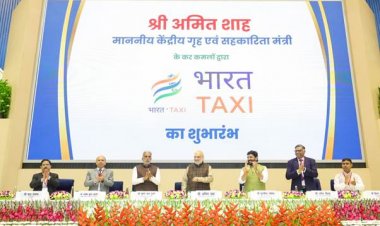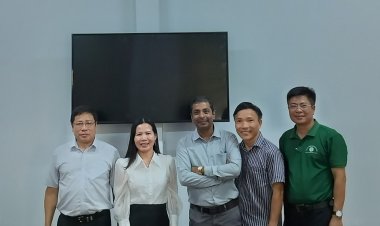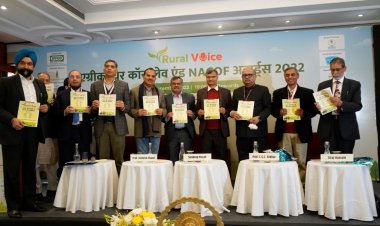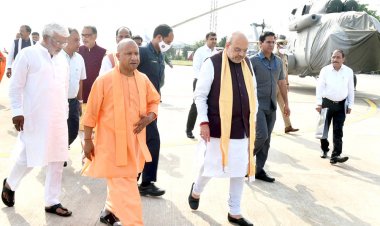Foundation for $5trn economy is possible through local govts: Dr WR Reddy, NIRDPR former DG
Dr W. R. Reddy former DG of NIRDPR, Hyderabad, inaugurated the ICSSR-sponsored two-day National Seminar on ‘Village@75: Role of Villages in Nation Building: Achievements, Challenges and Solutions’ organized by the Academy of Grassroots Studies and Research of India (AGRASRI), a Tirupati-based Research Institute, as part of the Azadi Ka Amrit Mahotsav. The National Seminar has formulated nine recommendations for the growth of villages as foundations and pillars of nation-building. These include reducing the Gender Gap Index ranking, devolving the 3Fs to the PRIs properly and establishing Role Model Villages.
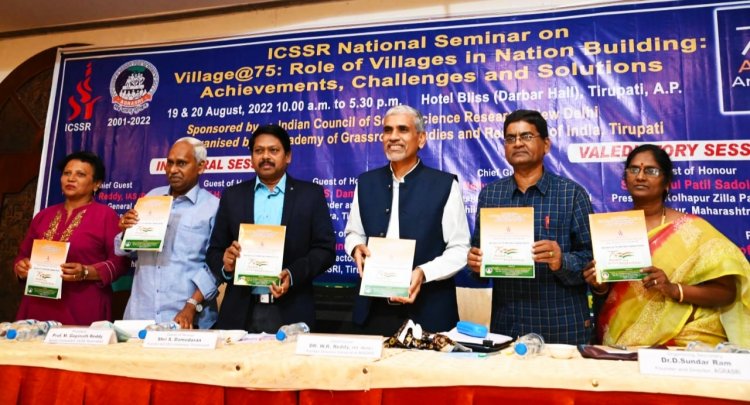
Tirupati
To achieve India’s $5trn economy target through inclusive governance, active participation of the rural people in the decision-making process at the grassroots level is a requisite measure and solution, said Dr W. R. Reddy, former Director-General (DG) of the National Institute of Rural Development and Panchayati Raj (NIRDPR), Hyderabad.
Inaugurating the ICSSR-sponsored two-day National Seminar on ‘Village@75: Role of Villages in Nation Building: Achievements, Challenges and Solutions’ organized by the Academy of Grassroots Studies and Research of India (AGRASRI), a Tirupati-based Research Institute, as part of the Azadi Ka Amrit Mahotsav, Dr Reddy stressed that it was thanks to the 73rd Constitutional Amendment Act (CAA) that the Panchayati Raj Institutions (PRIs) were working for good governance in the villages today. People of India will always remember the contributions and services made by Rajiv Gandhi in bringing the 73rd and 74th Amendment Acts with the main objective “Power to the People” at the grassroots level, he said. This was stated in an AGRASRI press release.
Projecting the significance of the local governments in India since Independence, Dr Reddy opined that today the PRIs were facing a lot of problems with insufficient resources from the Central and State Governments. He suggested that every Gram Panchayat could utilize the youth power, women’s participation, and involvement of citizens in the decision-making process to overcome the haunting problems in the villages.
Presiding over the inaugural session, Prof. M. Gopinath Reddy, Consultant, Centre for Economic and Social Studies, Hyderabad, said that India had come a long way in terms of socio-economic transformation although we still had serious deficiencies in the socio-economic development of the Indian villages. Analyzing the poverty scenario and infrastructural arena in India after 75 years of Independence, Prof. Reddy explained that serious inter- and intra-State differences existed with regard to poverty ratios and infrastructural development. The South Indian States as well as a few from Western India have moved ahead in many indicators while a few northern Indian states such UP, Bihar and Madhya Pradesh and some North-Eastern States are lagging behind on many parameters.
Dr B. Vengamma, Director-cum-Vice-Chancellor of SVIMS University, said that the migration from rural areas to urban ones reversed after the Covid pandemic. He said that this new development augured well for the sustainable growth and development of villages in India.
C.S. Reddy, Founder and CEO, AP Abhivruddhi Society (APMAS), Hyderabad, said that village-level self-sustainable economic growth was possible only through the active participation of women, especially the Self-Help Groups (SHGs), in India.
S Damodaran, a Padma Shri awardee and Founder of Gramalaya, Tiruchirapalli, Tamil Nadu, said that the role of villages in natural farming, recycling the wastewater for cultivating vegetables and plants, and solid waste management would yield abundant results through SHGs. Gramalaya has adopted 25 villages in Jogulamba Gadwal District of Telangana state as a pilot study.
After the inaugural session, the National Seminar discussed many pertinent issues pertaining to the villages since 1947. There were five technical sessions chaired respectively by Prof. M. Gopinath Reddy, Consultant, Centre for Economic and Social Studies, Hyderabad; Prof. N. Sivanna, Hon. Professor at the Karnataka State Rural Development and Panchayati Raj University, Gadak; Prof. M. Devendra Babu, Professor of Decentralisation and Development (Retd.), Institute of Social and Economic Change, Bengaluru; Prof. A. Ranga Reddy, ICSSR Project Director, Sri Venkateswara University, Tirupati; and Prof. G. Sridhar, Professor of Rural Development (Retd.), Sri Krishnadevaraya University, Anantapur.
Resource persons from various universities and research institutions presented their research papers in these technical sessions. Besides, nearly 32 elected representatives of PRIs, women and youth leaders from various villages across the nation made their views and opinions extempore on the theme of the National Seminar.
Increase rural women empowerment
In 75 Years of independent India, the need of the hour is more and more to increase the rural women's participation in sustainable development in villages, said the Chief Guest Nelly Joey Rodrigues, President, Goa State Panchayati Mahila Shakti Abhiyan, Goa at the valedictory session. Emphasizing the role of women in local governance, she said that the South Goa District Panchayat had implemented many innovative schemes and programmes for the welfare of women, particularly SHGs, with the support and guidance of Gram Panchayats.
Delivering the valedictory address, A.K. Musthafa, President of Perinthalmanna Block Panchayat, Malappuram, District of Kerala, said that before the 73rd CAA, women had been only confined to kitchen and family affairs. But, after the enactment of the 73rd CAA, women’s participation has increased in multiple ways as key policymakers in Local Self-Government Institutions (LSGIs), especially in Kerala. They have delivered abundant output and achievements as compared to male elected representatives of PRIs. However, in many states, women are facing a lot of challenges and problems for their empowerment. This is the right occasion for all the women communities to get their legitimate share by approaching the state governments for speedy and urgent reforms in this arena, Musthafa said.
Dr D. Sundar Ram, Seminar Convener and Director of AGRASRI, co-ordinated the proceedings of the National Seminar. D. Sai Kumar and D. Sucharitha, Assistant Directors of AGRASRI, assisted the Seminar Convener in conducting the proceedings smoothly.
The National Seminar has formulated nine recommendations for the growth of villages as foundations and pillars of nation-building. These recommendations include taking urgent and required measures and actions by the Govt of India and all State Governments to reduce the Gender Gap Index ranking of India from 135 to a reasonable one; utilizing the services and expertise of the Panchayati Raj experts in drafting the Gram Panchayat Development Plans (GPDPs) by the Gram Panchayats; devolving the 3Fs — Funds, Functions and Functionaries — to the PRIs by all State Governments immediately as per the provisions of the 73rd CAA; establishing Role Model Villages across the nation; every Gram Panchayat using the expertise and support of the youth, women, retired employees, senior citizens in their concerned Gram Panchayat jurisdiction; utilizing the natural resources available in every Gram Panchayat for resource mobilization for overall developmental activities, apart from the Union Finance Commission and State Finance Commissions.



 Join the RuralVoice whatsapp group
Join the RuralVoice whatsapp group



















